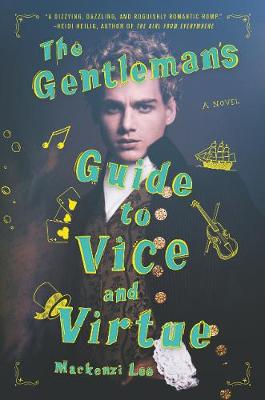There is very little in The Gentleman's Guide to Vice and Virtue that isn't utterly wonderful. The characters are well rendered, the pacing is spot on, the history is impeccable within the bounds of the fiction genre, and to top it all off, it's genuinely funny. There are elements of each of the main characters that will speak to each and every one of us. Monty, Percy, and Felicity are people we can all identify with, no matter our age, gender, race, ability, or sexuality. But most importantly it is a genuine historical portrayal of people who existed in history but never, ever get representation, and I can't tell you how utterly wonderful that is.
We are not broken things, neither of us. We are cracked pottery mended with lacquer and flakes of gold, whole as we are, complete unto each other. Complete and worthy and so very loved.
Henry Montague (Monty to his friends) is a rake and a buffoon. He's the stereotype of the excesses of the youth of the British aristocracy, and yet despite this manages to remain entirely likeable. His best friend Percy, on the other hand, is more calm and reasonable and represented as the kind of son any noble family would have been happy to have. He's equal parts fun-loving and responsible, with two caveats: he is biracial and epileptic. It speaks to Mackenzi Lee's talent as a writer that when we see Percy for the first few chapters through Monty's eyes that the colour of his skin never seems obvious, or relevant. It is only when the narrative introduces other characters, and we see Percy through their eyes rather than Monty's that the reader realises that Percy is not the noble we have been conditioned to picture in our mind's eye. The romance between the two is one I think we can all identify with. The fumbling flirtations of youth, the misunderstandings, and the obsession. I'm sure we all had romances like that at some point in our lives. It is so real and natural that it really highlights the tragedy of the way they felt being quite literally punishable by death. Felicity is also a fantastic character, although one who has had a great deal of representation in other works of historical fiction. Even that was a stroke of genius. So many writers have written about the repressed white woman who wanted to be more than her gender allowed, so having her as the character who manages to accept, despite not fully understanding, Monty's feelings for Percy really highlighted the importance of representation in fiction. She is also the one who understood most that Percy's epilepsy is not a malaise of the spirit but of the body, making her equal parts modern in her acceptance of science, but old-fashioned in her inability to fully understand anything not part of the accepted sexual norm.
Did I mention that The Gentleman's Guide to Vice and Virtuewas beautifully written? Well, it is. The imagery is lyrical and beautiful, with words that flowed like music. The story is wild and unruly, and while some of the events were not entirely believable, they worked in their historical setting and were rendered in a way that made the ring true and allowed complete suspension of disbelief. I would have liked to see a bit more development on the ending, which felt a bit sudden. Unfortunately, any more development would, historically speaking, probably not have resulted in a happy ending. It's probably a good thing it ended where it did so I can still imagine that every one of the characters that I came to love over the course of the novel got the happy ending they deserved.
He nods, and I nod, and Helena says nothing, and the sort of silence that makes a man want to talk about the weather falls between us.
The Gentleman's Guide to Vice and Virtue is brilliant. It's diverse, well researched, and wonderfully written. YA novels are dealing with the themes that used to be the reserve of literary fiction. So many people criticise modern works of fiction for being shallow and frivolous, but I think that's just because they don't read enough YA.
